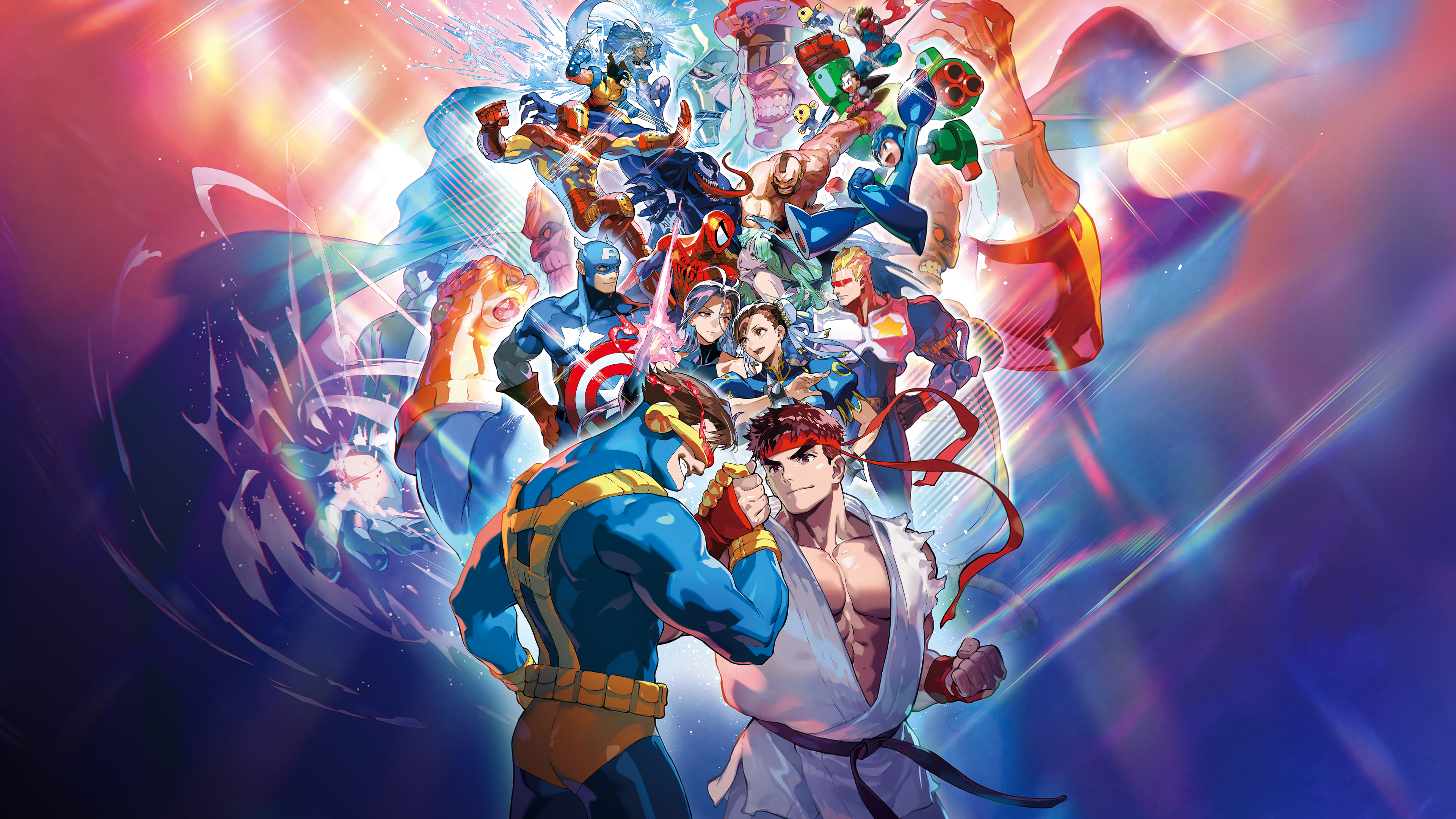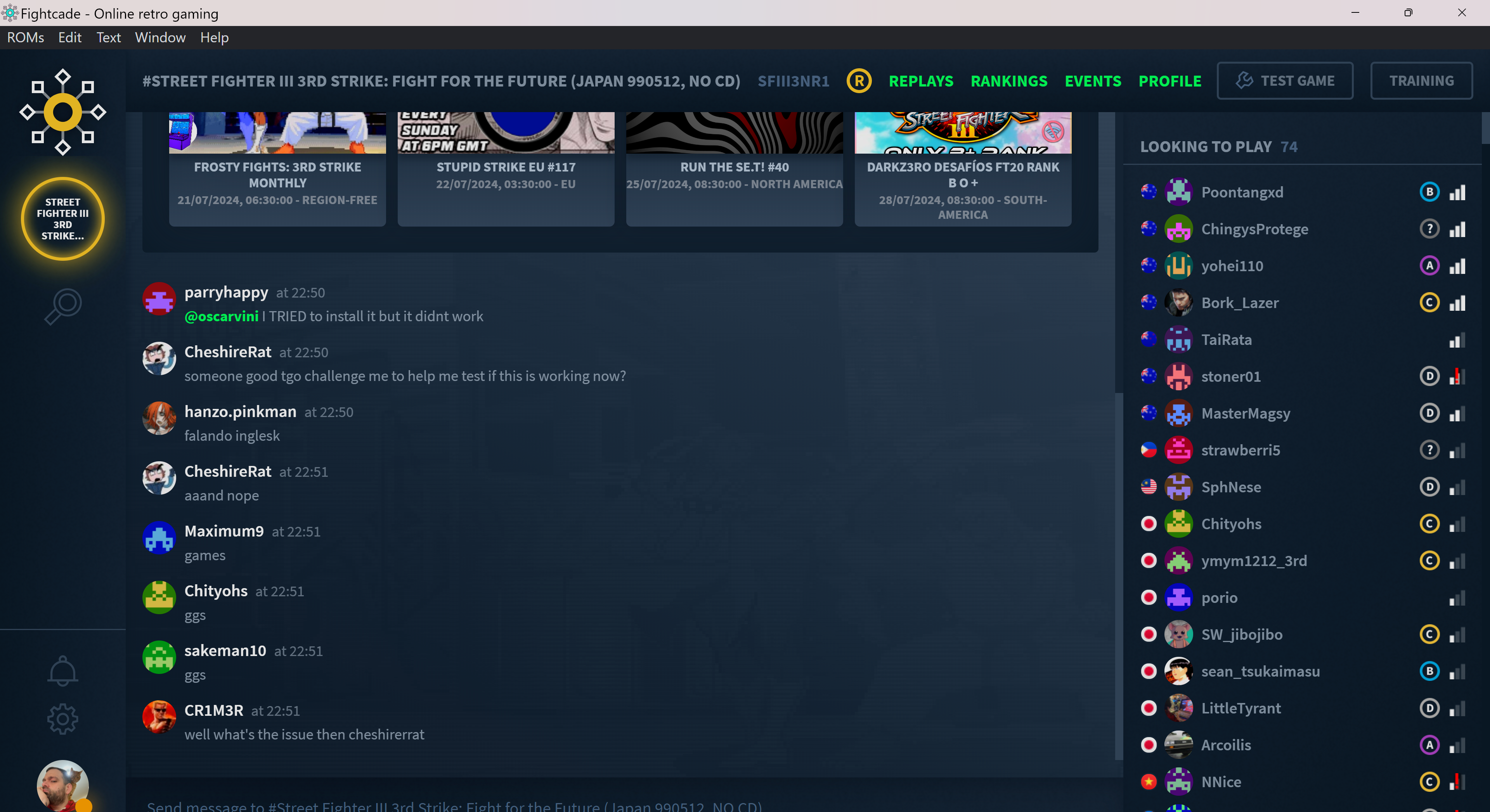I can't believe Fightcade exists
20 July 2024 • Andy Corrigan

It seems those in the fighting game community are hungrier than ever to revisit the older games they loved.
Street Fighter III: 3rd Strike still routinely has brackets at major tournaments worldwide. Other older franchises, like those in SNK’s back catalogue, often get representation at the local level (attending my local casuals is often eye-opening - I mean, what even is a ‘Buriki One’?!), and the entire fighting game community lost its collective mind at the recent Marvel vs. Capcom Collection announcement.
Underlying all that, we also still must have the ‘new game bad, old game good’ discourse with every new release because lord knows that’s never fucking boring apparently.
Despite the apparent hunger from fans, supporting these old games has always proven a bit of a challenge for publishers. The cost of repackaging classics and keeping them available doesn’t always marry well enough with revenue (aka the reasons businesses operate). Fighting games are also a weird genre that must cater to both the casual and hardcore to ensure financial success, and finding the balance can be difficult.
 A collection worth celebrating, for sure, but competitive players will be cautious...
A collection worth celebrating, for sure, but competitive players will be cautious...
The Street Fighter 30th Anniversary Collection is a great example of just that. The collection is a wonderful crash course of series history for both the old and nostalgic and the young and curious. There’s no easier way to play through most of the series than this… if you’re a casual player.
For the competitive, the collection drew ire for technical reasons. Street Fighter III: 3rd Strike, in particular, had wildly different input delays on each format, making it non-viable for those wanting to take it seriously.
Those technical problems aren’t always a developer’s fault. Hardware’s changed a lot since all these games released in arcades. PlayStation, Xbox, PC, and Switch all have vastly different internal components and system architectures, which makes matching like-for-like a challenge, especially with the limited budgets and development time rereleases tend to get.
The result is… not great for competitive play, but it’s understandable. As a long-time fan, you might not like it, but you can see why it happens.
Unfortunately, those technical disparities mean although the Collection still likely sold gangbusters, the online modes died pretty quickly. Casual fighting game fans never cared about the online grind in the first place and the hardcore fans chose to continue playing their favourites elsewhere.
And that elsewhere is what I’m writing about here; it’s a service called Fightcade, and I want to spread the good word.
So, what is Fightcade?
Fightcade, a passion project from a small group of developers, is a free service that adds online matchmaking, rollback netcode, and ranked play to classic arcade games through emulation.
Though it’s called ‘Fightcade’, its reach extends beyond competitive fighting games and into other areas of arcade culture. You can play side-scrolling beat ‘em ups, shmups, and puzzle games against real people worldwide (or, more realistically, those in your geographical location - international ping is still a problem, after all).
There are wrinkles that make Fightcade more of a task for the dedicated than the casual, however.
Fightcade provides the software and the means to emulate these games and play them online, but they do not provide the games themselves. That burden is on the players and for very obvious legal reasons.
So, you need to do some legwork, and getting everything you need to make Fightcade work can be… faffy for the non-technical. You need the exact ROM version for every game you want to play, plus any needed prerequisites. If you want training modes to learn how to play (or at least better ones than the defaults), you need Lua scripts.
Even though there are detailed guides widely available on web for all this, people still struggle with setup.
Pro-tip: You can make setup really easy by doing a web search for 'fc2 json files', clicking on the most relevant link and downloading its .zip file, and extracting its contents to your Fightcade install’s ‘emulator’ folder. With these files in the right place, you’ll automatically download and update everything you need whenever you join a game’s lobby.
When you do get it working, Fightcade is magic.
How Fightcade works
So, for those used to playing modern fighting games online, things work a little differently on Fightcade.
Firstly, after you’ve logged in, you must join a game’s lobby to play it. In the lobby there’s a chat window and lists of available players, in-progress matches (that you can spectate), and those logged in but unavailable.
Here’s where you might get uncomfortable: there are no online queues. You can’t simply wait for Fightcade to match you with someone else based on criteria; you must actively take the initiative and challenge people to fight. That can be a little intimidating if you’re used to the disassociation and dehumanisation of modern online games.
The reason for this system is necessity. Fightcade is amazing, but it’s also niche and those using it are the scene’s most dedicated. The passion of Fightcade users exceeds those happy to play whatever the modern release cycle gives them - they want their favourite games to live on, after all. On numbers alone, they’re a minority.
So even though I’m rarely hurting for a match on 3rd Strike - my go-to game and the most popular on the service - the number of suitable opponents is still low by modern standards. When you’re talking tens rather than hundreds in terms of viable opponents, a queuing system would only see me waiting ages or playing against the same few people over and over.
For those of us old enough to grow up in the 90s, the idea of ‘challenging someone to a game’ is just how things worked. You’d walk up to a cabinet in an arcade and challenge the person already playing, or mark your place in the queue of challengers with your money.
Fightcade basically turns that arcade experience into a UI.
If your favourite game isn't one of the most popular, you might need to work a little harder to find matches than others. If you can’t find games in your region with good ping, you could try scouring Discords or forums to get your fix. I also highly recommend finding someone at your level so you can learn and practice together, and encourage each other to keep improving.
 Lobbying for matches...
Lobbying for matches...
Preservation society
Honestly, Fightcade is a miracle service. It should not exist. What it offers would feel a technical impossibility from big teams with money behind them, let alone a handful of hobbyists. It’s so good, its very existence makes it hard for publishers to pull people away to their own, legally obtainable equivalents.
I often wonder what those publishers and their developers make of Fightcade. Have publishers ever tried to take it down? Have they tried to partner with it or even buy it? Do they use it? Are they resentful? Envious?
Surely they’d have to admire it on some level?
After all, Fightcade’s responsible for competition, community, and consistency for games that publishers don’t always know what to do with.
For that reason, Fightcade goes beyond the idea of emulation as games preservation. Whether through necessity, by accident, or with intent, it preserves not only the games available through it, but also the interactions and sense of culture they inspired.